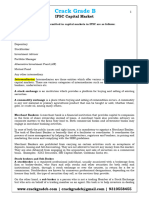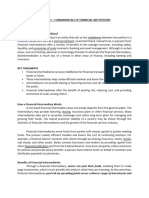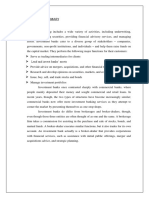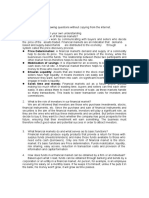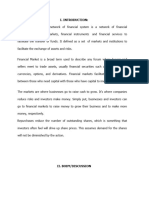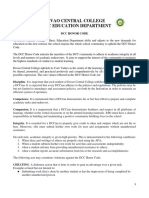0 ratings0% found this document useful (0 votes)
162 viewsCapital Market Intermediaries
Capital Market Intermediaries
Uploaded by
Sebin SebastianCapital market intermediaries provide essential services in the market. Some key intermediaries include stock brokers, merchant bankers, underwriters, depository participants, registrars and transfer agents, mutual funds, venture capital funds, portfolio managers, and credit research agencies. They act as intermediaries between public capital markets, financiers, and portfolio managers.
Copyright:
© All Rights Reserved
Available Formats
Download as PDF, TXT or read online from Scribd
Capital Market Intermediaries
Capital Market Intermediaries
Uploaded by
Sebin Sebastian0 ratings0% found this document useful (0 votes)
162 views15 pagesCapital market intermediaries provide essential services in the market. Some key intermediaries include stock brokers, merchant bankers, underwriters, depository participants, registrars and transfer agents, mutual funds, venture capital funds, portfolio managers, and credit research agencies. They act as intermediaries between public capital markets, financiers, and portfolio managers.
Original Description:
capital market intermediaries
Original Title
capital market intermediaries
Copyright
© © All Rights Reserved
Available Formats
PDF, TXT or read online from Scribd
Share this document
Did you find this document useful?
Is this content inappropriate?
Capital market intermediaries provide essential services in the market. Some key intermediaries include stock brokers, merchant bankers, underwriters, depository participants, registrars and transfer agents, mutual funds, venture capital funds, portfolio managers, and credit research agencies. They act as intermediaries between public capital markets, financiers, and portfolio managers.
Copyright:
© All Rights Reserved
Available Formats
Download as PDF, TXT or read online from Scribd
Download as pdf or txt
0 ratings0% found this document useful (0 votes)
162 views15 pagesCapital Market Intermediaries
Capital Market Intermediaries
Uploaded by
Sebin SebastianCapital market intermediaries provide essential services in the market. Some key intermediaries include stock brokers, merchant bankers, underwriters, depository participants, registrars and transfer agents, mutual funds, venture capital funds, portfolio managers, and credit research agencies. They act as intermediaries between public capital markets, financiers, and portfolio managers.
Copyright:
© All Rights Reserved
Available Formats
Download as PDF, TXT or read online from Scribd
Download as pdf or txt
You are on page 1of 15
CAPITAL MARKET INTERMEDIARIES
STOCK BROKERS
MERCHANT BANKERS UNDERWRITERS
DEPOSITORY REGISTERER &
PARTICIPTANT TRANSFER AGENT.
INTERMEDIARIES
PUBLIC CAPITAL MARKETS
PORTFOLIO INTERMEDIARIES FINANCIERS
MANAGERS
MUTUAL FUNDS CREDIT RESEARCH VENTURE CAPTAL
AGENCY
Firm or person (such as a broker or consultant)
who acts as a mediator on a link
between parties to a business deal, investment
decision, negotiation, etc. In money markets, for
example, banks act as intermediaries between
depositors seeking interest
income and borrowers seeking debt capital.
Intermediaries usually specialize in specific
areas, and serve as a conduit for market and
other types of information.
Also called a middleman. See
also intermediation.
Intermediaries are service providers in
the market, including stock brokers, sub-
brokers, financiers, merchant
bankers, underwriters, depository
participants, registrar and transfer
agents, FIIs/ sub accounts, mutual
Funds, venture capital funds, portfolio
managers, custodians, etc
A stockbroker is a regulated professional
individual, usually associated with
a brokerage form firm or broker-dealer,
who buys and sells stocks and other
securities for both retail and institutional
clients, through a stock exchange or over
the counter, in return for
a fee or commission. Stockbrokers are
known by numerous professional
designations, depending on the license
they hold, the type of securities they sell,
or the services they provide.
is a person OR a business entity who makes their
money from investments, typically involving
large sums of money and usually
involving private equity and venture
capital, leveraged buyouts, corporate
finance, investment banking and/or large-
scale asset management.
A financier makes money through this process
when his or her investment is paid back with
interest, from part of the
company's equity awarded to them as specified
by the business deal, or a financier can generate
income through commission, performance, and
management fees
A merchant bank is a financial institution that
provides capital to companies in the form
of share ownership instead of loans. A merchant
bank also provides advisory on corporate matters
to the firms they lend to.
Both commercial banks and investment
banks may engage in merchant banking
activities. Historically, merchant banks' original
purpose was to facilitate and/or finance
production and trade of commodities, hence the
name "merchant". Few banks today restrict their
activities to such a narrow scope.
A company or other entity that
administers the public issuance and
distribution of securities from a
corporation or other issuing body. An
underwriter works closely with the issuing
body to determine the offering price of
the securities, buys them from the issuer
and sells them to investors via the
underwriter's distribution network
EX- MB and syndicate members.
Depository system introduced in India in the year
1996.
In India, a Depository Participant (DP) is
described as an agent of the depository. They are
the intermediaries between the depository and
the investors. The relationship between the DPs
and the depository is governed by an agreement
made between the two under the Depositories
Act.
Service provided-
Dematerialization, Rematerialization, Transfers
of securities, settlement of trades.
In india- NSDL & CDSL are the two entity.
Registrar are the trusts or institutions that
register and maintain detailed records of the
transactions of investors for the convenience
of mutual fund houses.
Registrar or transfer agents are the trusts or
institutions that register and maintain
detailed records of the transactions of
investors for the convenience of mutual fund
houses.
A mutual fund is a type of professionally
managed collective investment scheme that
pools money from many investors to
purchase securities. While there is no legal
definition of the term "mutual fund", it is
most commonly applied only to those
collective investment vehicles that are
regulated and sold to the general public.
They are sometimes referred to as
"investment companies" or "registered
investment companies. Most mutual funds
are "open-ended," meaning investors can buy
or sell shares of the fund at any time
Venture capital (VC) is financial capital provided
to early-stage, high-potential, high
risk, growth start-up companies. The venture
capital fund makes money by owning equity in
the companies it invests in. The typical venture
capital investment occurs after the seed
funding round as the first round of institutional
capital to fund growth (also referred to as Series
A round) in the interest of generating a return
through an eventual realization event, such as
an IPO or trade sale of the company. Venture
capital is a subset of private equity.
Therefore, all venture capital is private
equity, but not all private equity is venture
A portfolio manager is either a person who
makes investment decisions using money other people
have placed under his or her control or a person who
manages a financial institution's asset and liability (loan
and deposit) portfolios. On the investments side, they
work with a team of analysts and researchers, and are
ultimately responsible for establishing an
investment strategy,
Portfolio managers are presented with investment ideas
from internal buy-side analysts and sell-side analysts
from investment banks. It is their job to sift through the
relevant information and use their judgment to buy and
sell securities. Throughout each day, they read
reports, talk to company managers and
monitor industry and economic trends looking for the right
company and time to invest the portfolio's capital.
A financial professional who has expertise
in evaluating the creditworthiness of
individuals and businesses. Credit analysts
determine the likelihood that a borrower
will be able to meet financial obligations
and pay back a loan, often by reviewing
the borrower's financial history and
determining whether market conditions
will be conducive to repayment.
http://www.businessdictionary.com/definition/intermediary.htm
l#ixzz2ouGsrKeW
You might also like
- Lesson 9 - Current and Future Trends in Media and Info. TGDocument16 pagesLesson 9 - Current and Future Trends in Media and Info. TGEnan Garcia80% (5)
- Software Product Development A Complete Guide - 2020 EditionFrom EverandSoftware Product Development A Complete Guide - 2020 EditionNo ratings yet
- Firefighter's Forcible Entry Hinge-Pull Prop How-to-BuildDocument11 pagesFirefighter's Forcible Entry Hinge-Pull Prop How-to-Buildsherpa285100% (4)
- Investigation into the Adherence to Corporate Governance in Zimbabwe’s SME SectorFrom EverandInvestigation into the Adherence to Corporate Governance in Zimbabwe’s SME SectorNo ratings yet
- A Practical Approach to the Study of Indian Capital MarketsFrom EverandA Practical Approach to the Study of Indian Capital MarketsNo ratings yet
- Value Chain Management Capability A Complete Guide - 2020 EditionFrom EverandValue Chain Management Capability A Complete Guide - 2020 EditionNo ratings yet
- Entrepreneurial Leadership A Complete Guide - 2020 EditionFrom EverandEntrepreneurial Leadership A Complete Guide - 2020 EditionNo ratings yet
- Investment BankingDocument12 pagesInvestment BankingrocksonNo ratings yet
- Stock Exchange Part 2Document5 pagesStock Exchange Part 2mrn69092No ratings yet
- Capital Market Midterm Reviewer 1Document13 pagesCapital Market Midterm Reviewer 1geverachristinemaeNo ratings yet
- Handouts in BusfinDocument2 pagesHandouts in BusfinAimelenne Jay AninionNo ratings yet
- Business FinanceDocument3 pagesBusiness Financepauline cunananNo ratings yet
- IFSCA_Capital_Market_2__1__lyst1727090126089 (1)Document22 pagesIFSCA_Capital_Market_2__1__lyst1727090126089 (1)Rajat TomarNo ratings yet
- Lesson 2 Self AssessmentDocument2 pagesLesson 2 Self AssessmentRimuruNo ratings yet
- Module 3Document8 pagesModule 3theresabalagata03No ratings yet
- Notes For Fina - Doc2003Document8 pagesNotes For Fina - Doc2003abhijeetpatil15No ratings yet
- Market Participants Include Individual Retail Investors, Institutional Investors (E.g., PensionDocument3 pagesMarket Participants Include Individual Retail Investors, Institutional Investors (E.g., PensionBCom 2 B RPD CollegeNo ratings yet
- Capital Market, Financial Intermediaries and The Roles of Asset ManagersDocument4 pagesCapital Market, Financial Intermediaries and The Roles of Asset Managersalveemss22No ratings yet
- Main Project of Investment BankingDocument44 pagesMain Project of Investment Bankingsupriyashewale87% (45)
- BankFin Midterm Mod5Document6 pagesBankFin Midterm Mod5Devon DebarrasNo ratings yet
- Finmar NotesDocument5 pagesFinmar NotesariannejonesmNo ratings yet
- Executive SummaryDocument42 pagesExecutive SummarybhaveshjadavNo ratings yet
- Blackbook On MFDocument36 pagesBlackbook On MFrohanNo ratings yet
- Banking and Financial Institution 1ST Term MT ReviewerDocument16 pagesBanking and Financial Institution 1ST Term MT ReviewerAly JoNo ratings yet
- Secondary MarketDocument85 pagesSecondary MarketMRS.NAMRATA KISHNANI BSSSNo ratings yet
- Players in Financial Markets by Sourabh JainDocument14 pagesPlayers in Financial Markets by Sourabh JainSourabh JainNo ratings yet
- What Is A Financial IntermediaryDocument2 pagesWhat Is A Financial IntermediaryYash GuptaNo ratings yet
- Financial MarketDocument3 pagesFinancial MarketChristian FloraldeNo ratings yet
- Shivajirao S. Jondhale Institute of Management Science and Research, AsangaonDocument13 pagesShivajirao S. Jondhale Institute of Management Science and Research, AsangaonROHITNo ratings yet
- Investment Management: Who Does It?: Investment Management Is The Professional Management of VariousDocument11 pagesInvestment Management: Who Does It?: Investment Management Is The Professional Management of VariousAnkit MaheshwariNo ratings yet
- Investment BankingDocument56 pagesInvestment BankingKomal MansukhaniNo ratings yet
- BBMF2013 Tutorial Answers Chapter 2 Financial EnvironmentDocument3 pagesBBMF2013 Tutorial Answers Chapter 2 Financial Environmentmathisfun.malaysiaNo ratings yet
- Unit 1Document16 pagesUnit 1Shivam YadavNo ratings yet
- Capital Markets Module 1 ReviewerDocument5 pagesCapital Markets Module 1 RevieweritsthlhzlNo ratings yet
- Investment BankingDocument85 pagesInvestment BankingJoshuva DanielNo ratings yet
- Financial-Market BSA3Document11 pagesFinancial-Market BSA3morales.jeuneallenNo ratings yet
- FM Unit 2Document9 pagesFM Unit 2Sheik FareethNo ratings yet
- Executive SummaryDocument54 pagesExecutive SummarybhaveshjadavNo ratings yet
- What Does Private Equity Mean?Document4 pagesWhat Does Private Equity Mean?Shweta ShettyNo ratings yet
- Mahran Final 2 Organized (1) RemovedDocument15 pagesMahran Final 2 Organized (1) RemovedAhmed Adly MohamedNo ratings yet
- NBFI'sDocument31 pagesNBFI'sMuhammad Shabahat AhmadNo ratings yet
- Retail Banking and Wealth ManagementDocument40 pagesRetail Banking and Wealth ManagementAditi BhandariNo ratings yet
- STOCKDocument7 pagesSTOCKElizabeth OlaNo ratings yet
- Investment Banking Is A Specific Division of Banking Related To The Creation of Capital For Other CompaniesDocument4 pagesInvestment Banking Is A Specific Division of Banking Related To The Creation of Capital For Other CompaniesSameer BheriNo ratings yet
- CapitalDocument5 pagesCapitalLyn AmbrayNo ratings yet
- ProjectDocument17 pagesProjectaniketsawant8003No ratings yet
- Investment and ManagementDocument14 pagesInvestment and ManagementJessamine PanedaNo ratings yet
- Financial Services ProjectDocument32 pagesFinancial Services Projecthimita desaiNo ratings yet
- Introduction To Financial ManagementDocument16 pagesIntroduction To Financial ManagementJherica Grace FloresNo ratings yet
- Chapter 2 Financial Intermediaries and Other ParticipantsDocument45 pagesChapter 2 Financial Intermediaries and Other ParticipantsWill De OcampoNo ratings yet
- Investment BankingDocument61 pagesInvestment BankingAbbas Taher PocketwalaNo ratings yet
- Financial Institutions TheoryDocument4 pagesFinancial Institutions TheorySandeep Singh SikerwarNo ratings yet
- Specialty CorporationDocument171 pagesSpecialty CorporationAdrian Steven Claude CosicoNo ratings yet
- Financial Markets and Institutions 1Document29 pagesFinancial Markets and Institutions 1Hamza Iqbal100% (1)
- What Is SEBI? Securities and Exchange Board of India (SEBI) Is An Apex Body For Overall Development andDocument11 pagesWhat Is SEBI? Securities and Exchange Board of India (SEBI) Is An Apex Body For Overall Development andRishi Sinha0% (2)
- Participants in Stock MarketDocument5 pagesParticipants in Stock Marketnimish85dubeyNo ratings yet
- Jamaica Auto Show-Updated Feb16th2006Document4 pagesJamaica Auto Show-Updated Feb16th2006OMNo ratings yet
- GuidelinesDocument14 pagesGuidelinesEinalial Arravan100% (5)
- DCC Bed Honor CodeDocument2 pagesDCC Bed Honor CodeErlyn RamirezNo ratings yet
- Hook Point Slide DeckDocument57 pagesHook Point Slide DeckChristine Mwaura100% (4)
- Assessment 3 - Module 3 Quiz - CourseraDocument1 pageAssessment 3 - Module 3 Quiz - CourseraCarla MissionaNo ratings yet
- Steve IrwinDocument9 pagesSteve IrwinmrsdalgleishNo ratings yet
- DLL-science2 Week 1 22-23Document3 pagesDLL-science2 Week 1 22-23Sheena Claire dela Pe?No ratings yet
- Rubric For Making A ClaimDocument2 pagesRubric For Making A Claimapi-240194213100% (1)
- AF210 Unit1 Tutorial Suggested SolutionsDocument3 pagesAF210 Unit1 Tutorial Suggested SolutionsChand DivneshNo ratings yet
- Edexcel IAL Mathematics Formula BookDocument30 pagesEdexcel IAL Mathematics Formula BookThanuj Perera100% (3)
- Like You Do Hanne de VriesDocument2 pagesLike You Do Hanne de VriesAnshuman SoyNo ratings yet
- 190 Number BingoDocument17 pages190 Number BingoVaanmatheNo ratings yet
- MV TonsbergDocument4 pagesMV Tonsbergalison_15796310No ratings yet
- Magsumbol Vs People Case DigestDocument1 pageMagsumbol Vs People Case DigestSittie Rania CANDOTANNo ratings yet
- A Critical Analysis On India's Internet ShutdownsDocument11 pagesA Critical Analysis On India's Internet ShutdownsAnanthu SureshNo ratings yet
- Film Brief: A Day in The Life of A TeacherDocument2 pagesFilm Brief: A Day in The Life of A TeacherzoelinguaNo ratings yet
- 019 - Harrod Last Five Eprs RedactedDocument10 pages019 - Harrod Last Five Eprs Redactedapi-317210322No ratings yet
- Mera Bill Mera Adhikar Scheme DetailsDocument7 pagesMera Bill Mera Adhikar Scheme DetailsThe United IndianNo ratings yet
- Total CO2 Equivalent Life Cycle Emissions From C - 2022 - Renewable and SustainaDocument12 pagesTotal CO2 Equivalent Life Cycle Emissions From C - 2022 - Renewable and SustainaDiana SulistiawatiNo ratings yet
- A Small Pain in My ChestDocument2 pagesA Small Pain in My ChestMd Tabish RazaNo ratings yet
- Summary of Teaching Load FINAL 2022 Qualification UPDATEDDocument10 pagesSummary of Teaching Load FINAL 2022 Qualification UPDATEDRegine ManuelNo ratings yet
- The Rhetoric of Malcolm XDocument13 pagesThe Rhetoric of Malcolm Xgideon mbathaNo ratings yet
- Middle School Choir Presentation Script HandoutDocument5 pagesMiddle School Choir Presentation Script Handoutapi-334651370100% (1)
- Technopreneurship 101: Module 6: Business ModelDocument83 pagesTechnopreneurship 101: Module 6: Business ModelTOLENTINO, Julius Mark VirayNo ratings yet
- Subtraction Lesson PlanDocument5 pagesSubtraction Lesson PlanFatima ObaidNo ratings yet
- Transfer Information DocumentDocument2 pagesTransfer Information Documentshahzeel khanNo ratings yet
- Ermac vs. ErmacDocument7 pagesErmac vs. Ermaccarl dianneNo ratings yet
- BIM Proj Execution PlanDocument27 pagesBIM Proj Execution PlanEdward CNo ratings yet


















